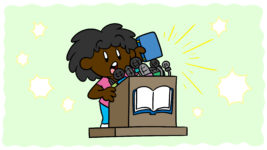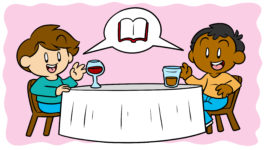Oh come ON! As if promoting your work as a self-published author isn’t already hard enough – a never-ending, always changing task that most creatives feel completely unprepared to tackle – now you have to worry about over-promoting your book? What’s the worst that can happen; too many people buy it?
Unfortunately, no, but things still aren’t all that bleak. Over-promotion is an important consideration, but it only applies to certain types of marketing, and the prevention is way, way easier than the cure.
Over-promotion and you
A book is over-promoted when your marketing is alienating more potential readers than it’s attracting. Think of the annoying radio ad you’ve heard one too many times or the TV spot that was so irritating you vowed never to give that company your money if you could help it.
In most cases, authors aren’t in a position to over-promote their work. Book trailers are rare, and unless you’re with a publishing house you probably aren’t benefiting from radio spots and billboards. Likewise, good guerrilla marketing isn’t likely to get on anyone’s nerves due to repetition – if someone keeps turning up to your book readings or entering your giveaways, they don’t really have grounds to complain.
The one time when self-published authors truly risk over-promotion is when they contact potential readers directly, either via email lists or social media. Unfortunately, direct contact (especially in the form of social media) is the self-publishing author’s greatest marketing tool, so while over-promotion isn’t going to dog your every effort, it is worth avoiding.
Social media and email lists
When it comes to your email list, at least, the rules are simple: send a message only when you have something to say. If you’re adding to your fans’ inbox clutter, you’re likely to end up blocked. A new project justifies an email, as does a giveaway or event. Otherwise, leave your poor fans alone. They can visit your social media for everyday chit-chat, so make sure that when they see your name in their inbox, they’re right to feel excited.
Social media is a far trickier proposition. The whole point is to maintain a consistent relationship with your readers, and if you’re bringing out a new book, it’s understandable that that’s what’s on your mind all day, every day. Still, hearing about the same book constantly, over and over and over again, can irritate readers to the point where you’re doing more harm than good.
It’s easy for potential readers to change their social media settings so they’re no longer hearing from an overly self-promotional author, and once they do, they’re probably not going to tune back in. Ever.
Effective promotion for individual projects
The way you usually use social media defines what’s going to
feel excessive to the fans who follow you. If you post every day, then a little
promotion every day will mix fine with what your followers are expecting. If,
on the other hand, you post once a month, daily promotion is going to feel like
a bombardment, and readers may even be irritated that you’re only showing up to
sell your wares.
As a general rule, social media promotion is about using your usual social media output to promote your work, rather than adding a bunch of promotion on top of your regular use. That said, it’s only to be expected that you’re a little more present during a major event, and if you don’t usually use social media, the benefits of proper promotion will generally outweigh staying consistently absent (but, if possible, start building your presence a few months prior to promoting a specific product.)
If you are posting every day, try to pick a specific time during which you’ll engage in promotion. Your followers will have more patience for an hour period during which you’re promoting your work than for a seemingly endless barrage of marketing.
A flood of marketing can actually persuade people to go from being curious about your book to buying it – the sense that something is being talked about is a powerful influence – so it’s not so much about keeping your promotion minimal as it is about keeping your effusive self-promotion confined to set periods. If a celebrity is going on about their new book for an hour, followers who aren’t interested (or who already pre-ordered the darn thing a week ago) are more likely to just ignore their promotion than take steps to distance themselves from it.
Still, constant self-promotion gets boring, and it’s inadvisable to engage in this kind of direct marketing for more than a month either side of release. Of course, you can mention your work at any time, but focused promotion is a lot more excusable when it’s about something recent.
Timing isn’t the only thing you can do to prevent over-promotion – a lot depends on how you’re promoting your work.
Engaging self-promotion
Keeping promotion from becoming over-promotion is helped by making sure each instance of promotion feels like a different piece of content. If you’re sharing the same short promotional video or image again and again, over-promotion is almost instantaneous, since your followers have already seen what you have to offer.
If you follow authors on Twitter, you’ll notice that the majority of their marketing is done by retweeting praise from elsewhere. Fans will send compliments, pictures of themselves with the book, mini-reviews – discrete units of promotion that the author can then share on their own account. The readers get to interact with their favorite creator and the author gets to promote their work in a way which feels natural and compelling – win-win!
There are several aspects to this type of book promotion that keep it from feeling like over-promotion. First, the way that social media is presented stops it feeling like it’s all coming from the author. Especially on Twitter, there’s only an incidental mention of why you’re seeing the message, so it feels more like everyone is discussing the work in question than that the author is having a marketing binge. Second, this type of content tells a story. It’s usually funny, or interesting, or insightful – that’s why it caught the author’s attention – which means you’re not just getting promotion, you’re also getting content. Even if it’s just an amusing photo or turn of phrase, the readers get something along with their marketing, and that makes it feel less intrusive.
Again, you want to time your promotion. Even a funny, natural discussion of how great your book is will grate after a while. But get your timing right, and this is how promotion can be engaging for months at a time, not to mention self-perpetuating. When users keep seeing people talking about your book, they’ll get curious and want to join in, providing new posts that keep the process ticking over.
If this all sounds a little gross, it’s only because describing any natural system makes it sound strange. This type of promotion isn’t some kind of confidence trick – authors are excited about their work and so are readers, and sharing that excitement gets other people excited too. It’s great! And it remains great as long as a little attention is paid to not annoying anyone who doesn’t feel like joining in.
Avoiding over-promotion
Avoiding over-promotion isn’t about limiting how you market your book – it’s actually a much more involved process where, months into your marketing plan, you’re still intriguing new readers without boring those who were with you from day one.
Focus your attention, employ content from third parties – especially where it includes added value – and create the sense of a bubbling conversation. Unless you’re a truly dedicated student of human nature, it can be shocking how a book you’ve been hearing about for three, four, five days suddenly becomes irresistibly interesting on the sixth. We’re social animals, and we really struggle to stay on the outside when there’s no barrier between us and the party within.
Which creators have alienated you with over-promotion and which have charmed you? Let me know in the comments, and check out Why Images Should Be Part Of Your Book Marketing Strategy and Want To Be More Productive On Social Media? Here’s How for more advice on this topic.





